-
About
- About Listly
- Community & Support
- Howto
- Chrome Extension
- Bookmarklet
- WordPress Plugin
- Listly Premium
- Privacy
- Terms
- DMCA Copyright
- © 2010-2024 Boomy Labs


 Jon Samuelson
Jon Samuelson
Listly by Jon Samuelson
A list of ten books Austin Kleon shared from 2016. They are not necessarily new books, but books he read in 2016. You can subscribe to his newsletter at his website: austinkleon.com
I have also added my favorite books from Austin at the bottom of the list.
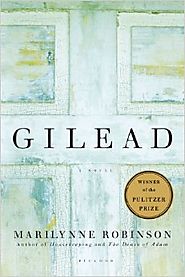
Nearly 25 years after Housekeeping, Marilynne Robinson returns with an intimate tale of three generations, from the Civil War to the 20th century: a story about fathers and sons and the spiritual battles that still rage at America's heart. In the words of Kirkus, it is a novel "as big as a nation, as quiet as thought, and moving as prayer. Matchless and towering." Gilead tells the story of America and will break your heart.
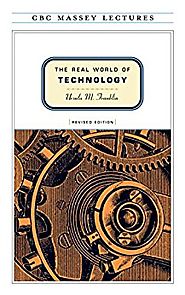
In this expanded edition of her bestselling 1989 CBC Massey Lectures, renowned scientist and humanitarian Ursula M. Franklin examines the impact of technology upon our lives and addresses the extraordinary changes since The Real World of Technology was first published.
In four new chapters, Franklin tackles contentious issues, such as the dilution of privacy and intellectual property rights, the impact of the current technology on government and governance, the shift from consumer capitalism to investment capitalism, and the influence of the Internet upon the craft of writing.
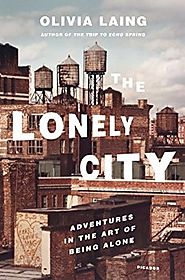
What does it mean to be lonely? How do we live, if we're not intimately engaged with another human being? How do we connect with other people? Does technology draw us closer together or trap us behind screens?
When Olivia Laing moved to New York City in her mid-thirties, she found herself inhabiting loneliness on a daily basis. Increasingly fascinated by this most shameful of experiences, she began to explore the lonely city by way of art. Moving fluidly between works and lives - from Edward Hopper's Nighthawks to Andy Warhol's Time Capsules, from Henry Darger's hoarding to the depredations of the AIDS crisis - Laing conducts an electric, dazzling investigation into what it means to be alone, illuminating not only the causes of loneliness but also how it might be resisted and redeemed.
Humane, provocative and deeply moving, The Lonely City is about the spaces between people and the things that draw them together, about sexuality, mortality and the magical possibilities of art. It's a celebration of a strange and lovely state, adrift from the larger continent of human experience, but intrinsic to the very act of being alive.
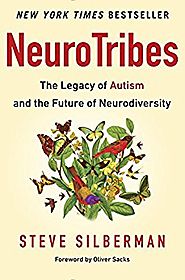
What is autism? A lifelong disability, or a naturally occurring form of cognitive difference akin to certain forms of genius? In truth, it is all of these things and more—and the future of our society depends on our understanding it. WIRED reporter Steve Silberman unearths the secret history of autism, long suppressed by the same clinicians who became famous for discovering it, and finds surprising answers to the crucial question of why the number of diagnoses has soared in recent years.
Going back to the earliest days of autism research and chronicling the brave and lonely journey of autistic people and their families through the decades, Silberman provides long-sought solutions to the autism puzzle, while mapping out a path for our society toward a more humane world in which people with learning differences and those who love them have access to the resources they need to live happier, healthier, more secure, and more meaningful lives.
Along the way, he reveals the untold story of Hans Asperger, the father of Asperger’s syndrome, whose “little professors” were targeted by the darkest social-engineering experiment in human history; exposes the covert campaign by child psychiatrist Leo Kanner to suppress knowledge of the autism spectrum for fifty years; and casts light on the growing movement of "neurodiversity" activists seeking respect, support, technological innovation, accommodations in the workplace and in education, and the right to self-determination for those with cognitive differences
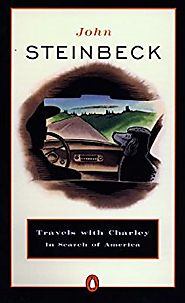
In September 1960, John Steinbeck embarked on a journey across America. He felt that he might have lost touch with the country, with its speech, the smell of its grass and trees, its color and quality of light, the pulse of its people. To reassure himself, he set out on a voyage of rediscovery of the American identity, accompanied by a distinguished French poodle named Charley; and riding in a three-quarter-ton pickup truck named Rocinante.
His course took him through almost forty states: northward from Long Island to Maine; through the Midwest to Chicago; onward by way of Minnesota, North Dakota, Montana (with which he fell in love), and Idaho to Seattle, south to San Francisco and his birthplace, Salinas; eastward through the Mojave, New Mexico, Arizona, to the vast hospitality of Texas, to New Orleans and a shocking drama of desegregation; finally, on the last leg, through Alabama, Virginia, Pennsylvania, and New Jersey to New York.
Travels with Charley in Search of America is an intimate look at one of America's most beloved writers in the later years of his life—a self-portrait of a man who never wrote an explicit autobiography. Written during a time of upheaval and racial tension in the South—which Steinbeck witnessed firsthand—Travels with Charley is a stunning evocation of America on the eve of a tumultuous decade. This Penguin Classics Deluxe Edition also features French flaps and deckle-edged paper.
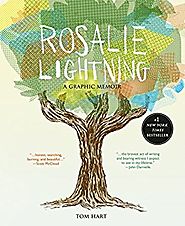
A Goodreads Choice Award Semi-Finalist, Amazon Best Book of 2016, one of The Washington Post's Best Graphic Novels of 2016, and one of Publishers Weekly's 100 Best Books of 2016, ROSALIE LIGHTNING is Eisner-nominated cartoonist Tom Hart's #1 New York Times bestselling touching and beautiful graphic memoir about the untimely death of his young daughter, Rosalie. His heart-breaking and emotional illustrations strike readers to the core, and take them along his family's journey through loss. Hart uses the graphic form to articulate his and his wife's on-going search for meaning in the aftermath of Rosalie's death, exploring themes of grief, hopelessness, rebirth, and eventually finding hope again.
Hart creatively portrays the solace he discovers in nature, philosophy, great works of literature, and art across all mediums in this expressively honest and loving tribute to his baby girl. Rosalie Lighting is a graphic masterpiece chronicling a father's undying love.
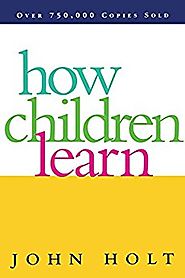
This enduring classic of educational thought offers teachers and parents deep, original insight into the nature of early learning. John Holt was the first to make clear that, for small children, “learning is as natural as breathing.” In this delightful yet profound book, he looks at how we learn to talk, to read, to count, and to reason, and how we can nurture and encourage these natural abilities in our children.”
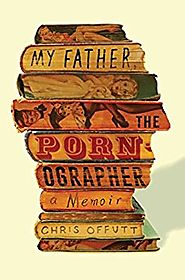
When Andrew Offutt died, his son, Chris, inherited a desk, a rifle, and eighteen hundred pounds of pornographic fiction. Andrew had been considered the “king of twentieth-century smut,” with a writing career that began as a strategy to pay for his son’s orthodontic needs and soon took on a life of its own, peaking during the 1970s when the commercial popularity of the erotic novel reached its height.
With his dutiful wife serving as typist, Andrew wrote from their home in the Kentucky hills, locked away in an office no one dared intrude upon. In this fashion he wrote more than four hundred novels, including pirate porn, ghost porn, zombie porn, and secret agent porn. The more he wrote, the more intense his ambition became and the more difficult it was for his children to be part of his world.
Over the long summer of 2013, Chris returned to his hometown to help his widowed mother move out of his childhood home. As he began to examine his father’s manuscripts and memorabilia, journals, and letters, he realized he finally had an opportunity to gain insight into the difficult, mercurial, sometimes cruel man he’d loved and feared in equal measure. Only in his father’s absence could he truly make sense of the man and his legacy.
In My Father, the Pornographer, Offutt takes us on the journey with him, reading his father’s prodigious literary output as both a critic and as a son seeking answers. This is a book about the life of a working writer who supports his family solely by the output of his typewriter; it’s about the awful psychic burdens one generation unthinkingly passes along to the next; and it’s about growing up in the Appalachian hills with a pack of fearless boys riding bicycles through the woods, happy and free.
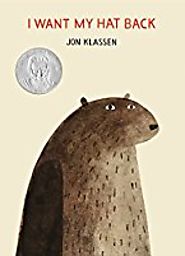
The bear's hat is gone, and he wants it back. Patiently and politely, he asks the animals he comes across, one by one, whether they have seen it. Each animal says no, some more elaborately than others. But just as the bear begins to despond, a deer comes by and asks a simple question that sparks the bear's memory and renews his search with a vengeance. Told completely in dialogue, this delicious take on the classic repetitive tale plays out in sly illustrations laced with visual humor-- and winks at the reader with a wry irreverence that will have kids of all ages thrilled to be in on the joke.
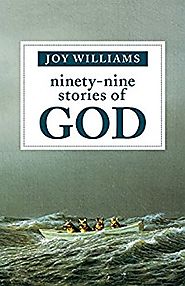
Pulitzer Prize and National Book Award finalist Joy Williams has a one-of-a-kind gift for capturing both the absurdity and the darkness of everyday life. In Ninety-Nine Stories of God, she takes on one of mankind’s most confounding preoccupations: the Supreme Being.
This series of short, fictional vignettes explores our day-to-day interactions with an ever-elusive and arbitrary God. It’s the Book of Common Prayer as seen through a looking glass—a powerfully vivid collection of seemingly random life moments. The figures that haunt these stories range from Kafka (talking to a fish) to the Aztecs, Tolstoy to Abraham and Sarah, O. J. Simpson to a pack of wolves. Most of Williams’s characters, however, are like the rest of us: anonymous strivers and bumblers who brush up against God in the least expected places or go searching for Him when He’s standing right there. The Lord shows up at a hot-dog-eating contest, a demolition derby, a formal gala, and a drugstore, where he’s in line to get a shingles vaccination. At turns comic and yearning, lyric and aphoristic, Ninety-Nine Stories of God serves as a pure distillation of one of our great artists.
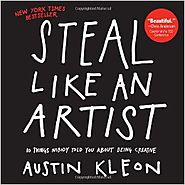
You don’t need to be a genius, you just need to be yourself. That’s the message from Austin Kleon, a young writer and artist who knows that creativity is everywhere, creativity is for everyone. A manifesto for the digital age, Steal Like an Artist is a guide whose positive message, graphic look and illustrations, exercises, and examples will put readers directly in touch with their artistic side.
When Mr. Kleon was asked to address college students in upstate New York, he shaped his speech around the ten things he wished someone had told him when he was starting out. The talk went viral, and its author dug deeper into his own ideas to create Steal Like an Artist, the book. The result is inspiring, hip, original, practical, and entertaining. And filled with new truths about creativity: Nothing is original, so embrace influence, collect ideas, and remix and re-imagine to discover your own path. Follow your interests wherever they take you. Stay smart, stay out of debt, and risk being boring—the creative you will need to make room to be wild and daring in your imagination.
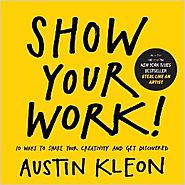
Show Your Work! is about why generosity trumps genius. It’s about getting findable, about using the network instead of wasting time “networking.” It’s not self-promotion, it’s self-discovery―let others into your process, then let them steal from you. Filled with illustrations, quotes, stories, and examples, Show Your Work! offers ten transformative rules for being open, generous, brave, productive.
In chapters such as You Don’t Have to Be a Genius; Share Something Small Every Day; and Stick Around, Kleon creates a user’s manual for embracing the communal nature of creativity― what he calls the “ecology of talent.” From broader life lessons about work (you can’t find your voice if you don’t use it) to the etiquette of sharing―and the dangers of oversharing―to the practicalities of Internet life (build a good domain name; give credit when credit is due), it’s an inspiring manifesto for succeeding as any kind of artist or entrepreneur in the digital age.
